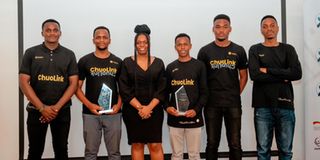Students’ innovation transforms learning experience at UDSM

The co-founders of Chuolink, Abdulrahim Malya (second from left) and Raymond Mao (third from right), hold awards they received during their graduation from Programme 101 at the University of Dar es Salaam recently. In the middle are StartHub Africa co-founder and managing director in Tanzania, Ms Shekina Mshana and other members of the Chuolink pioneers group. PHOTO | COURTESY
What you need to know:
- The soaring graduate unemployment rate has forced the university to embark on such a journey, nurturing a culture of entrepreneurship among its students before graduation.
Dar es Salaam. Chuolink, a mobile application developed by second-year students at the University of Dar es Salaam’s ICT College, is now making students’ lives easier, The Citizen has learned.
The App, the brainchild of second-year students Abdulrahim Malya, Raymond Mao, and Adolph Tabaro, offers a platform that empowers students with information, guidance, and opportunities while on their academic trajectory.
The soaring graduate unemployment rate has forced the university to embark on such a journey, nurturing a culture of entrepreneurship among its students before graduation.
According to Mr Abdulrahim Malya, 24, innovation enables students to explore a vast array of courses, aligning their interests with potential career paths.
“The platform employs advanced procedures to provide personalised course recommendations based on individual grades, subjects, and interests,” he said.
The application, he noted, connects students with industry experts for invaluable career guidance. “Through seamless virtual consultations, students gain insights into various professions, helping them make informed decisions about their future.”
Through the platform, students fill out a single application form and apply to multiple universities, streamlining a traditionally time-consuming and error-prone procedure.
“Recognising the financial barriers to education, Chuolink acts as a conduit to scholarship opportunities. The platform not only helps students identify scholarships but also facilitates the application process, ensuring that deserving individuals can pursue their academic dreams,” he affirmed.
In a short span, the application has already made a substantial impact, reaching over 1000 students within two weeks of its launch.
“Through this application, I was able to connect with one of the senior engineers in the country. She advised me how I can succeed in the electrical engineering industry, and I gained confidence that is now pushing me,” explained Rosemary Jordan, a second-year student at UDSM.
Mr Malya said in an interview that they aim to make the educational journey seamless for students, providing them with a comprehensive tool to navigate the complexities of higher education.
The innovation has emerged from the Startup 101 programme, a collaborative initiative between UDSM and StartHub Africa.
Co-founder and managing director of StartHub Africa in Tanzania, Ms Shekina Mshana, stressed the significance of investing in students, saying, “We decided to invest in students because they have the energy to think and come up with various innovations that respond to the challenges that society is already facing.”
The collaboration extends beyond academic training; it actively supports students in navigating legal processes, ensuring their ideas are compliant and ready for market entry.
Upon completing the Startup 101 programme, students’ transition into the catalyst phase is treated not as students but as fully-fledged companies. StartHub Africa steps in, providing venture-building support and connecting them with investors to further develop and scale their businesses.
Through this programme, students are provided with the necessary tools to conceive and implement ideas that address real-world challenges within their communities.
Experts believe the shift from academia to the business world emphasises the practical implementation of knowledge, fostering a culture of entrepreneurship among graduates.
The University of Dar es Salaam ICT Incubator (UDICTI) plays a pivotal role in this venture, underscoring the importance of academic-industry linkage in addressing employment challenges.
The coordinator of the UDICTI Startup Academy, Dr Diana Rwegasira, highlighted the significance of providing students with a holistic education that combines theoretical knowledge with practical, industry-relevant skills.
Further, the Coordinator for Innovations at the College, Dr Moses Ismael, commended the students for embodying the spirit of innovation, citing the evolution of the university’s vision from conceptualising UDICTI in 2010 to creating thriving hubs like FinHub.





